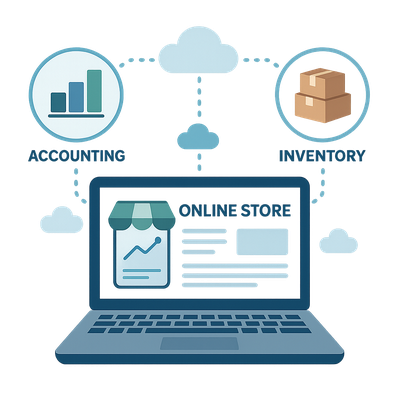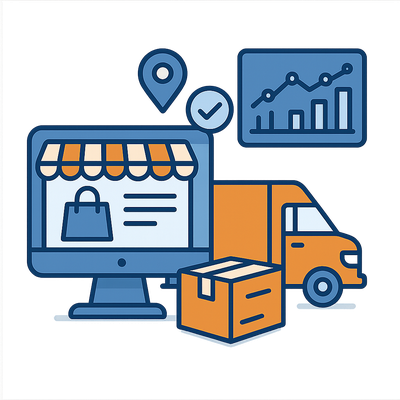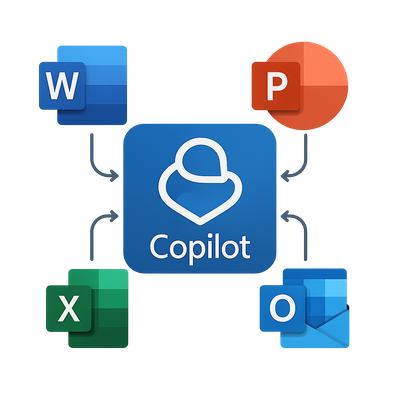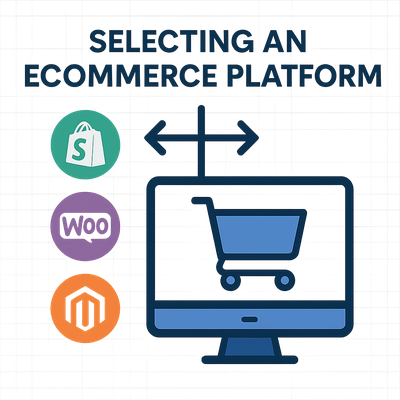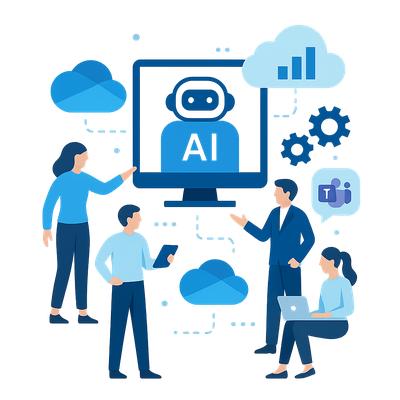
By Geek - October 2025
Artificial Intelligence (AI) is no longer a futuristic idea. It is an essential part of how modern businesses operate. From automating repetitive tasks to supporting decision making, AI tools are transforming how companies of all sizes work, communicate, and grow. Understanding how to use these technologies effectively can make a major difference in productivity, cost savings, and employee engagement.
Understanding AI in the Workplace
AI in business covers a wide range of technologies that simulate human intelligence. These include natural language processing, machine learning, data analytics, and automation. Many of the tools that employees already use, such as chat assistants, customer support systems, and scheduling platforms, are now enhanced with AI capabilities. They analyse data, predict outcomes, and take action automatically to reduce the time spent on routine tasks.
AI does not replace people. Instead, it supports them by handling repetitive or data-heavy work. Employees can then focus on creative, strategic, and relationship-driven activities that add greater value to the business.
Automation and Efficiency Gains
One of the clearest benefits of AI in the workplace is automation. Intelligent automation combines robotic process automation with machine learning to handle tasks like data entry, invoice processing, and report generation. In finance, for example, AI can reconcile transactions or flag inconsistencies faster than any manual process. In customer service, AI chatbots can resolve common issues instantly, allowing staff to focus on complex cases that need a personal touch.
Businesses adopting AI automation often see immediate gains in speed and accuracy. Tasks that once required hours now take minutes. This allows teams to manage higher workloads without adding headcount, which is especially valuable for small and medium enterprises.
Data-Driven Decision Making
AI tools excel at analysing large volumes of data to identify trends, risks, and opportunities. Predictive analytics can forecast sales, estimate demand, or detect operational bottlenecks. These insights allow managers to make informed decisions backed by evidence instead of guesswork.
For example, AI-powered dashboards can combine live sales figures, marketing performance, and supply chain data into a single view. Decision makers can immediately see what is working, what is slowing down, and where to invest resources. As AI models learn from new information, they become better at highlighting patterns and providing recommendations that support business goals.
Enhancing Collaboration and Communication
AI is also reshaping how teams collaborate. Modern communication tools now include intelligent features such as real-time translation, meeting transcription, and automated note generation. These innovations reduce communication barriers across different languages and time zones.
In project management, AI can analyse team activity to identify potential delays or imbalanced workloads. This ensures that projects stay on schedule and resources are allocated effectively. Within email and chat platforms, AI can summarise long threads, flag important messages, or recommend next steps, helping staff manage their time more efficiently.
Improving Customer Experience
Customers now expect quick, accurate, and personalised service. AI tools help deliver that at scale. Intelligent chatbots handle questions instantly, recommendation engines suggest products based on user behaviour, and sentiment analysis tools measure satisfaction in real time.
For small businesses, these capabilities make it possible to provide enterprise-level customer service without needing large support teams. The data collected from these interactions can then be used to refine marketing, improve products, and build stronger relationships with clients.
“Artificial Intelligence is the new electricity.”
Supporting Human Resources and Recruitment
AI has become a valuable tool in recruitment and HR management. Automated systems can scan resumes, shortlist candidates, and even assess suitability based on skills and experience. AI analytics help HR teams identify trends in employee engagement, turnover, and performance, enabling proactive actions to improve retention.
During onboarding, AI chat assistants can guide new employees through company procedures and training materials. In larger organisations, workforce planning tools powered by AI can predict future hiring needs based on growth and seasonal demand.
Boosting Cybersecurity and Compliance
With the growth of remote work and cloud systems, cybersecurity has become a critical business priority. AI strengthens protection by detecting unusual activity, identifying threats, and responding to incidents faster than human teams alone could. AI-based security systems analyse behaviour patterns across devices and networks, flagging potential breaches before they escalate.
In regulated industries, AI tools assist with compliance monitoring. They automatically check transactions, audit trails, and communication logs for policy breaches or errors. This not only protects the business from risk but also saves time during audits and reporting cycles.
Reducing Costs and Increasing Scalability
Adopting AI does not only improve efficiency, it can also reduce operational costs. Automated workflows cut the need for manual data handling, while predictive analytics minimise waste by optimising stock levels, energy use, or logistics planning. As demand grows, AI systems scale easily without major new investment in staff or infrastructure.
Businesses that invest in AI early often gain a competitive advantage. They can operate leaner, deliver services faster, and respond more flexibly to market changes. This scalability is one of the reasons many companies are prioritising AI integration as part of their long-term strategy.
Employee Empowerment and Upskilling
Contrary to fears about job loss, AI can empower employees by giving them access to better information and smarter tools. Staff spend less time on repetitive work and more time developing new skills. Many companies are now introducing training programs to help employees understand how AI systems operate and how to use them to their advantage.
AI also supports wellbeing by reducing stress from administrative overload. Tools that help schedule meetings, summarise emails, and automate reporting create a more balanced workload. This contributes to higher satisfaction and retention rates among employees.
Challenges and Considerations
While the benefits of AI are clear, adopting it successfully requires planning and change management. Common challenges include data quality, system integration, and user training. Businesses must ensure that AI models are fed accurate, up-to-date data, and that employees trust and understand how these systems make decisions.
There are also ethical considerations. Organisations must handle data responsibly, ensure transparency in decision making, and protect customer privacy. Partnering with experienced consultants helps design an AI roadmap that aligns with business objectives while maintaining compliance and security.
Building an AI Strategy
A structured AI strategy starts with identifying areas of greatest potential impact. This could be customer service, data analysis, logistics, or administration. Next, assess existing systems and processes to see where automation or analytics can be introduced. Define measurable goals such as reduced processing time, improved accuracy, or higher satisfaction ratings.
Implementation should follow a phased approach. Begin with pilot projects that demonstrate quick wins, gather user feedback, and refine processes before scaling across departments. Training and communication are key to ensuring adoption. Employees who understand the purpose and benefits of AI are more likely to embrace it as a helpful tool rather than a disruptive change.
The Role of Cloud and Integration
Modern AI tools rely heavily on cloud computing. Platforms such as Microsoft 365, Azure, and Google Cloud offer ready-to-use AI capabilities that integrate directly with business systems. This enables small and medium businesses to access enterprise-grade technology without large upfront investment.
Integrating AI into existing workflows also maximises its value. Connecting AI tools to CRM systems, financial software, and communication platforms allows data to flow seamlessly across the organisation. This unified environment provides a single source of truth and supports better decision making.
Future Outlook: The AI-Enabled Workplace
The workplace of the future will rely on collaboration between humans and AI. Routine tasks will continue to be automated, while strategic decision making will become more data-driven. The focus will shift from simply adopting AI tools to creating an intelligent ecosystem that connects people, systems, and insights in real time.
Businesses that act now to develop clear AI strategies will be better positioned to innovate and adapt. They will also attract and retain talent that values technology-driven workplaces and continuous learning opportunities.
How Can We Help You?
We help businesses plan and implement AI tools that fit their goals. From assessing opportunities and selecting software to managing integration and training, we ensure that AI adoption delivers measurable results. We also help teams understand how to use these technologies responsibly and effectively, creating systems that boost productivity without adding complexity.
